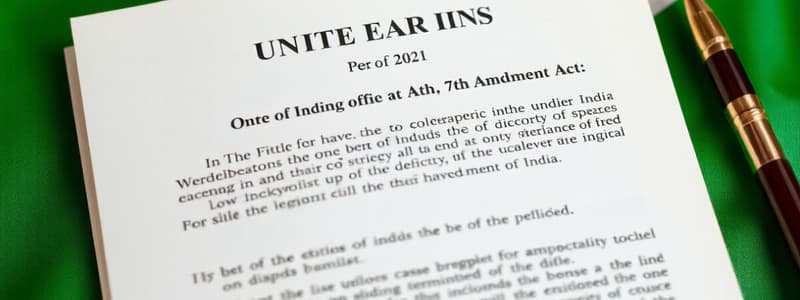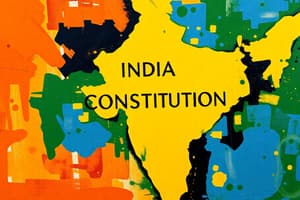Podcast
Questions and Answers
What is the significance of Article 368 in the Indian Constitution?
What is the significance of Article 368 in the Indian Constitution?
- It provides Parliament with powers to amend the Constitution. (correct)
- It allows the President to dissolve the Parliament.
- It establishes the fundamental rights of citizens.
- It outlines the structure of the judiciary.
Which amendment restructured states based on linguistic lines?
Which amendment restructured states based on linguistic lines?
- 9th Amendment Act
- 10th Amendment Act
- 12th Amendment Act
- 7th Amendment Act (correct)
What was introduced to the Indian Constitution as a result of the 7th Amendment Act?
What was introduced to the Indian Constitution as a result of the 7th Amendment Act?
- Federal structure
- Union Territories (correct)
- Fundamental Duties
- Panchayati Raj System
Which of the following is NOT a part of the changes made by the 7th Amendment Act?
Which of the following is NOT a part of the changes made by the 7th Amendment Act?
Which Schedule of the Indian Constitution was amended as a result of the 9th Amendment Act?
Which Schedule of the Indian Constitution was amended as a result of the 9th Amendment Act?
How would you classify the Indian Constitution based on Article 368?
How would you classify the Indian Constitution based on Article 368?
What remains unchanged even after amendments introduced by Parliament?
What remains unchanged even after amendments introduced by Parliament?
Which of the following articles was not amended by the 7th Amendment Act?
Which of the following articles was not amended by the 7th Amendment Act?
The 9th Amendment Act was passed in which year?
The 9th Amendment Act was passed in which year?
What is the primary reason for the difficulty in amending the Indian Constitution?
What is the primary reason for the difficulty in amending the Indian Constitution?
What significant change did the 44th Amendment Act introduce regarding property rights?
What significant change did the 44th Amendment Act introduce regarding property rights?
Which Amendment Act is responsible for the incorporation of Goa, Daman, and Diu into the Indian Union?
Which Amendment Act is responsible for the incorporation of Goa, Daman, and Diu into the Indian Union?
Which Article was added by the 13th Amendment Act to grant special status to Nagaland?
Which Article was added by the 13th Amendment Act to grant special status to Nagaland?
What major change was introduced by the 61st Amendment Act regarding voting?
What major change was introduced by the 61st Amendment Act regarding voting?
Which Amendment Act added the languages Manipuri, Konkani, and Nepali to the 8th Schedule?
Which Amendment Act added the languages Manipuri, Konkani, and Nepali to the 8th Schedule?
Which Amendment is associated with the introduction of Fundamental Duties in India?
Which Amendment is associated with the introduction of Fundamental Duties in India?
The abolition of the Privy Purse was a result of which Amendment Act?
The abolition of the Privy Purse was a result of which Amendment Act?
Which Amendment introduced the concept of Panchayat Raj by adding Part IX to the Constitution?
Which Amendment introduced the concept of Panchayat Raj by adding Part IX to the Constitution?
What was a result of the 40th Amendment Act concerning Sikkim?
What was a result of the 40th Amendment Act concerning Sikkim?
Which Amendment Act added Article 21A, ensuring free and compulsory education for children?
Which Amendment Act added Article 21A, ensuring free and compulsory education for children?
Which amendment introduced a maximum of 10% reservation for Economically Weaker Sections?
Which amendment introduced a maximum of 10% reservation for Economically Weaker Sections?
What significant change did the 96th Amendment Act make to the Eighth Schedule?
What significant change did the 96th Amendment Act make to the Eighth Schedule?
Which articles were introduced by the 102nd Amendment Act concerning the National Commission for Backward Classes?
Which articles were introduced by the 102nd Amendment Act concerning the National Commission for Backward Classes?
What significant modification was made by the 100th Amendment Act?
What significant modification was made by the 100th Amendment Act?
In which amendment was Part IXB added to the Constitution of India?
In which amendment was Part IXB added to the Constitution of India?
Which articles relate specifically to the introduction of Goods and Services Tax (GST)?
Which articles relate specifically to the introduction of Goods and Services Tax (GST)?
Which article was omitted under the 102nd Amendment Act?
Which article was omitted under the 102nd Amendment Act?
Which amendment corresponds to the extension of reservation of seats for SC/ST and nominations for Anglo-Indian members?
Which amendment corresponds to the extension of reservation of seats for SC/ST and nominations for Anglo-Indian members?
Which amendment contained provisions related to deletion of Article 268A?
Which amendment contained provisions related to deletion of Article 268A?
What was a key feature of the 103rd Amendment Act regarding Article 15?
What was a key feature of the 103rd Amendment Act regarding Article 15?
Flashcards are hidden until you start studying
Study Notes
Important Amendments in the Indian Constitution
- The Indian Constitution is a living document that has been amended several times to reflect the changing needs of the country.
- The power to amend the constitution rests with the Parliament under Article 368.
- Amendments are not easy and require specific processes and adherence to certain provisions.
- The Constitution of India is neither rigid nor flexible, allowing for amendments while maintaining its basic structure.
7th Amendment Act of 1956
- Reorganized states based on linguistic lines, abolishing the classification of states as Class A, B, C, and D.
- Introduced the concept of Union Territories, which are directly governed by the central government.
- Made changes to various articles concerning representation, judiciary, and governance at various levels (e.g., Article 80, 81, 82, 131, 153, 158, 168, 170, 171, 216, 217, 220, 222, 224, 230, 231, 232).
- Amended the First, Second, Fourth, and Seventh Schedules of the Constitution.
9th Amendment Act of 1960
- Adjusted Indian territory based on an agreement with Pakistan.
10th Amendment Act of 1961
- Incorporated Dadra, Nagar, and Haveli into the Indian Union as a Union Territory.
12th Amendment Act of 1961
- Incorporated Goa, Daman, and Diu into the Indian Union as a Union Territory.
13th Amendment Act of 1963
- Formed Nagaland with special status under Article 371A.
14th Amendment Act of 1962
- Incorporated Pondicherry into the Indian Union, adding Article 239A to the Constitution.
21st Amendment Act of 1967
- Included the Sindhi language in the 8th Schedule of the Constitution.
26th Amendment Act of 1971
- Abolished the Privy Purse, added Article 363A, and removed Articles 291 and 362.
36th Amendment Act of 1975
- Incorporated Sikkim as an Indian state.
- Added Article 371F to enhance the special status of Sikkim.
- Removed Article 2A, which dealt with the temporary provisions regarding Jammu and Kashmir.
40th Amendment Act of 1975
- Embodied fundamental duties, declared India as a Socialist Secular Republic.
- Amended multiple articles to strengthen the principles of secularism, socialism, and Directive Principles of State Policy.
42nd Amendment Act of 1976
- Included the Fundamental Duties in the Constitution.
- Strengthened the position of the President and Prime Minister.
- Declared India as a Socialist Secular Republic.
44th Amendment Act of 1978
- Removed the Right to Property from the list of fundamental rights.
- Amended multiple articles to strengthen the balance of power between the legislature and the executive.
61st Amendment Act of 1989
- Lowered the voting age from 21 to 18 years, reflecting the commitment to youth participation in democracy.
71st Amendment Act of 1992
- Added Manipuri, Konkani, and Nepali languages to the 8th Schedule of the Constitution, reflecting the diversity of Indian languages.
73rd Amendment Act of 1992
- Introduced the Panchayati Raj system, strengthening decentralized governance by adding Part IX to the Constitution.
74th Amendment Act of 1992
- Introduced municipalities and Nagarpalikas, strengthening urban local governance by adding Part IXA to the Constitution.
86th Amendment Act of 2002
- Made free and compulsory education for children between 6 and 14 years a fundamental right.
87th Amendment Act of 2003
- Added Santhali, Bodo, Dogri, and Maithili languages to the 8th Schedule of the Constitution, reflecting the diversity of Indian languages.
- Introduced the Service Tax.
95th Amendment Act 2010
- Extended reservation of seats for Scheduled Castes and Scheduled Tribes in the Lok Sabha and state assemblies.
- Provided for the nomination of Anglo-Indian members in Parliament and state Assemblies.
96th Amendment Act 2011
- Replaced "Oriya" with "Odia" in the 8th Schedule of the Indian Constitution.
97th Amendment Act 2012
- Introduced Part IXB in the Constitution of India, relating to Co-operative Societies.
100th Amendment Act 2015
- Amended the First Schedule, exchanging some enclave territories with Bangladesh.
- Conferred citizenship rights to citizens of these enclaves, resulting from the signing of the Land Boundary Agreement (LBA) Treaty between India and Bangladesh.
101st Amendment Act 2016
- Introduced the Goods and Services Tax (GST) by amending various articles (248, 249, 250, 268, 269, 270, 271, 286, 366, 368).
- Amended the Sixth and Seventh Schedules.
- Deleted Article 268A.
102nd Amendment Act 2018
- Added Articles 338B and 342A, providing constitutional status to the National Commission for Backward Classes.
- Added Clause 26C to Article 26.
- Omitted Article 340 and Modified Articles 338 and 366.
103rd Amendment Act 2019
- Amended Article 15, adding Clause 6 to provide a maximum 10% reservation for Economically Weaker Sections (EWS) of citizens belonging to classes other than SCs, STs, and OBCs.
- Amended Article 16, adding Clause 6, providing for reservation for EWS citizens in government jobs and educational institutions.
Studying That Suits You
Use AI to generate personalized quizzes and flashcards to suit your learning preferences.




